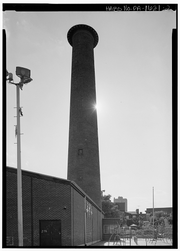Jim Gerlach (R-PA) is the representative for Pennsylvania’s 6th district. He came to speak at my place of employment today, addressing his adventures in the 100th Congress and how things are going to get nasty when the budget appropriations starts under the new Democratic majority. He spoke at length about his duties on the transportation subcommittee and some of Pennsylvania’s transportation woes.
A quick aside: He was a co-sponsor of a proposed 2005 bill to force social security taxes to be used for the sole purpose of social security. When someone asked about that bill and how it was forced to the side, Gerlach interjected, saying “You can call it dead.” So much for social security reform.
Now, on to transportation. Pennsylvania’s roads and highways are notoriously bad, and with the population drain from Philadelphia to the suburbs and beyond, the roads can get jammed at the first sign of trouble. Our mass transit system, the Southeastern Pennsylvania Transportation Authority continuously claims it is underfunded and threatens to scale back service and raise rates – it’s already the most expensive subway system in the US – every year.
When asked about some of the state’s transportation woes, he explained that unlike other states which require that infrastructure such as utilities and roads grow with population, Pennsylvania has no such doctrine. He added that there were some programs he was trying to get off the ground, such as the Schuylkill Valley Metro, which would run trains from Reading to Philadelphia, as well as his desire to secure more funds for major area roadways, such as US-30 and US-202. However, he did mention that one thing he was against was raising the federal gas tax. He said that, while it may be tempting to raise the gas tax to get more money for transportation projects, there is a large risk that Pennsylvania wouldn’t see any of the extra money.
Unfortunately, the lack of transportation funds from the feds will result in Ed Rendell’s state-based solutions. This will more likely result in a tax on oil companies’ profits, aka a gas tax. Another solution that has been floated before Rendell is the privatization of the Pennsylvania Turnpike. While I’m generally in favor of private toll roads, I hope that the revenue from that is earmarked solely for transportation rather than expenditures like his cockamamie socialized health care scheme and the next time a sports team threatens to leave.
On a personal note, I want to thank Sebastian for giving me the opportunity to guest blog for him while he was away. I hope that you at least found my viewpoints interesting, even if you didn’t agree with me.

